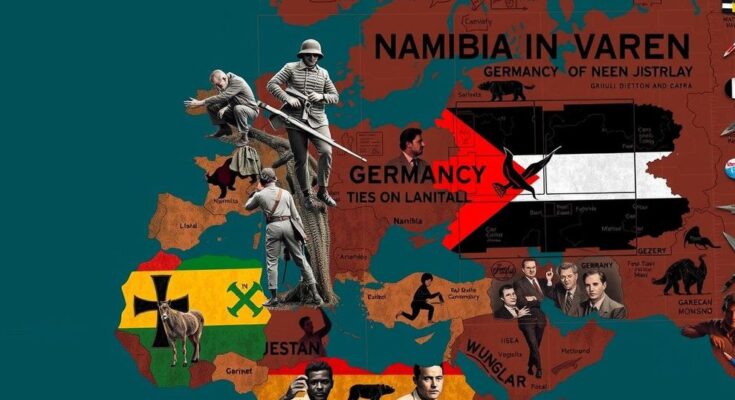The article examines the surge in protests against Israeli military operations in Gaza and Lebanon, highlighting significant civilian casualties and criticisms directed at German government officials for their controversial statements regarding the legitimacy of these actions. It draws historical comparisons to Germany’s own colonial genocide in Namibia, arguing that current support for Israel reflects a troubling legacy of complicity in violence and an abdication of moral responsibility in international affairs.
The ongoing conflict in Gaza and Lebanon has drawn significant public outcry, particularly in Germany, where protests have escalated against Israeli military actions. Since the commencement of hostilities in October 2023, over 42,600 Palestinian lives, including approximately 17,000 children, have been lost, with the situation in Lebanon similarly dire, reflecting a death toll exceeding 2,400. Protests in major European cities have seen citizens demanding an end to the violence and a halt to arms supplies to Israel, indicating widespread dissent against perceived complicity in the atrocities. Israeli Prime Minister Benjamin Netanyahu has attempted to link the continuation of the conflict to the leadership of Hamas, notably asserting that the assassination of key figures such as Yahya Sinwar could expedite an end to the conflict. Conversely, the actions of Israeli forces have been met with condemnation, showcasing a stark divide in public perception, as demonstrators in Berlin and other cities have faced heavy-handed responses from authorities. The German government has faced intense scrutiny for statements made by Foreign Minister Annalena Baerbock, suggesting that civilian casualties may be justified under the premise of self-defense. These remarks have been perceived as an endorsement of violence against civilians, prompting allegations from groups such as Hamas and international condemnation for legitimizing possible acts of genocide. A historical lens reveals that Germany’s current stance echoes its colonial past, wherein it acknowledges having committed genocide during its occupation of Namibia. Critics argue that Germany’s support for Israel amidst its military campaigns in Gaza parallels historical precedents of complicity in genocidal acts. Nicaragua’s recent filing with the International Court of Justice further amplifies these concerns, accusing Germany of facilitating the ongoing violence through military support. The European response has been increasingly vocal against the actions in both Gaza and Lebanon, with growing calls for war crimes accountability directed at Israel and support from Western nations. Amidst these developments, the legacy of Germany and its historical mistakes continue to cast a long shadow over its involvement in international affairs, raising urgent ethical questions about silence and complicity in the face of human rights violations.
The article discusses the recent escalation of violence in Gaza and Lebanon, focusing on the Israeli military’s actions, the resulting civilian casualties, and the international response, particularly from Germany and other European nations. This context is crucial as it highlights the ongoing humanitarian crisis and the implications of governmental policies on the ground. The wave of protests across Europe illustrates a significant grassroots movement opposing the violence and advocating for human rights, especially concerning Palestinian civilians. Additionally, the historical context of Germany’s colonial past regarding genocide in Namibia adds a layer of complexity to its current foreign policy decisions, informing the discourse on complicity and moral responsibility in international conflicts.
In summary, the situation in Gaza and Lebanon has prompted extensive public protests, particularly in Europe, as citizens demand accountability for the substantial loss of civilian life caused by Israeli military actions. The remarks made by German officials, particularly those that suggest civilian casualties may be permissible, have drawn widespread condemnation and accusations of complicity in potential genocide. Historical parallels with Germany’s actions in Namibia further emphasize the need for accountability and ethical consideration in the realm of international relations. The ongoing conflict exemplifies the broader issues of human rights, state accountability, and the role of international actors in conflict zones.
Original Source: www.tehrantimes.com




